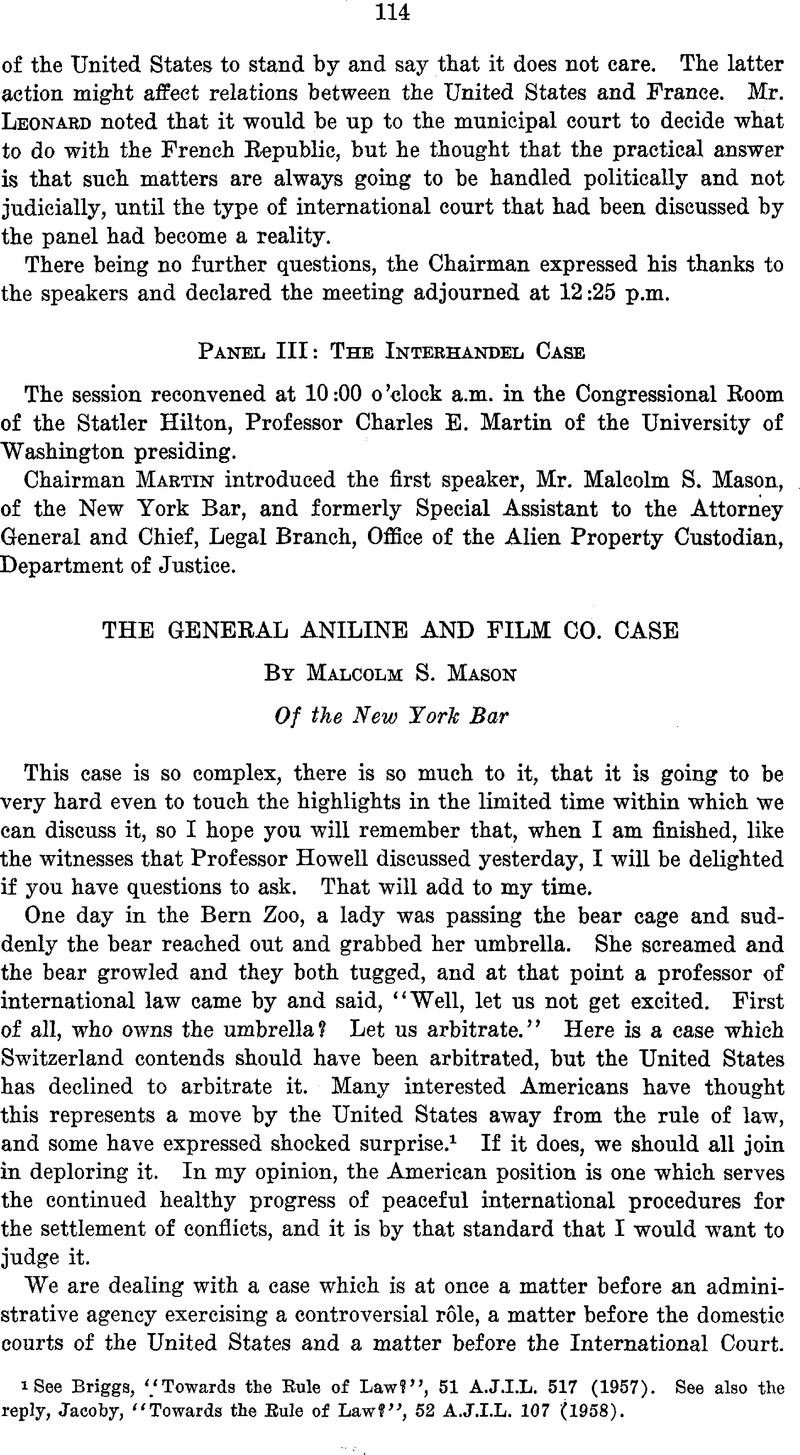No CrossRef data available.
Published online by Cambridge University Press: 27 February 2017

1 See Briggs, , “Towards the Rule of Law?”, 51 A.J.I.L. 517 (1957)Google Scholar. See also the reply, Jacoby, , “Towards the Rule of Law?”, 52 A.J.I.L. 107 (1958)Google Scholar.
2 For a fuller description of the enterprise, see General Aniline & Film Corporation Prospectus, dated Feb. 21, 1957
3 Statement of Counsel, Printed Joint Appendix in the Court of Appeals in 1955, Société Internationale etc. (I. G. Chemie) v. Brownell (No. 12140). Mémoire du Gouvernement de la Confédération Suisse, Affaire de l’Interhandel (Suisse c. Etats Unis d’Amerique), Cours Internationale de Justice (March, 1958), p. 8: “Il est indéniable que la I. G. Farben contrô1a la GAF par l’intermédiaire de l’Interhandel, jusqu’en 1940….”
4 Statement of Counsel, Printed Joint Appendix, cited above, pp. 91–92.
5 Administration of the Wartime Financial and Property Controls of the United States Government, Inter-American Conference on Systems of Economic and Financial Control 29–30, 36 (1942).
6 Code of Federal Regulations, Title 8, Ch. II, Sec. 505.10–505.15; GAF Prospectus, p. 15.
7 Argument of Professor Guggenheim, I.C.J. (CR 57/26), Oct. 12, 1957. In fact, we were both disappointed. The U. S. Supreme Court has, on the record, remanded the case for further consideration and proceedings, Société Internationale etc. v. Brownell, 357 U. S. 197 (June 16, 1958). From a preliminary reading of the opinion, it is not clear what further proceedings are to be expected. There is an intimation that the finding of good faith on Interhandel’s part may be re-examined. There is also an intimation that further effort to explore the proffers of partial compliance may be in order.
8 Paris Agreement, U. S. Treaties and Other International Acts Ser., No. 1655 (Dept. of State, 1946); cf. Maurer, and Simsarian, , “Agreement Relating to the Resolution of Conflicting Claims to German Enemy Assets,” 18 Dept. of State Bulletin 3 (1948)Google Scholar; Mason, , “Conflicting Claims to German External Assets,” 38 Georgetown Law Journal 171 (1950)Google Scholar.
9 14 Dept. of State Bulletin 1101, 1121 (1946); King, , “Swiss-Allied Arbitral Accord,” 46 A.J.I.L. 464 (1952)Google Scholar. Compare the Allied-Swedish Accord which is similar in tenor but less formal and elaborate in its machinery, and has, so far as is known, worked very well. See Rubin, , “Allied-Swedish Accord on German External Assets, Looted Gold and Related Matters,” 17 Dept. of State Bulletin 155, 162 (1947)Google Scholar.
10 The Snyder-Petitpierre Letters of Nov. 22, 1946.
11 Mason, , “Suit on an Unlicensed Transaction—Singer and the Specie Bank,” 16 University of Pittsburgh Law Review 16, 17–18 (1954)Google Scholar.
12 36 Dept. of State Bulletin 350 (1957).
13 There are some wise remarks on the real significance of reservations in De Visseher, “Reflections on the Present Prospects of International Adjudication,” 50 A.J.I.L. 467, 469–471 (1956). Binding advance commitments to submit international disputes to arbitration are in my view appropriate, safe and most useful precisely in those cases where there is least likelihood they will ever have to be invoked. Contrast in this respect the Allied-Swiss Accord with the Allied-Swedish Accord, and with the striking innovation of a binding conciliation under the Brussels Agreement. Mason, “Conflicting Claims to German External Assets,” 38 Georgetown Law Journal 171, 193–195 (1950), and 3 Arb. J. (N.S.) 80 (Summer, 1948).
14 This consideration underlines in fact the wisdom of the reservation made by British Commmonwealth countries, in their acceptance of International Court jurisdiction, of issues arising out of the recent hostilities. Incidentally, since the Washington Accord is a multilateral agreement to which the British Commonwealth countries are parties, this is an additional ground which (if it were invoked) would bar International Court jurisdiction.
15 Separate Opinion, Certain Norwegian Loans, [1957] I.C.J. Rep. 43–66; 51 A.J.I.L. 777 (1957); Separate Opinion, Request for Indication of Interim Measures of Protection, Interhandel Case, Oct. 24, 1957.
16 Order of Oct. 24, 1957, [1957] I.C.J. Rep. 105, 52 A.J.I.L. 320 (1958); Judge “Wellington Koo was of the view that the Court had no jurisdiction in view of the United States objection; Judge Klaestad (President Hackworth and Judge Read concurring) denied jurisdiction on the basis of the Norwegian Loans rule; Judge Lauterpacht considered the United States objection as removing prima facie jurisdiction. Judge Kojevnikov dissented without opinion. As background, see Dumbauld, “Relief Pendente Lite in the Permanent Court of International Justice,” 39 A.J.I.L. 391 (1945).